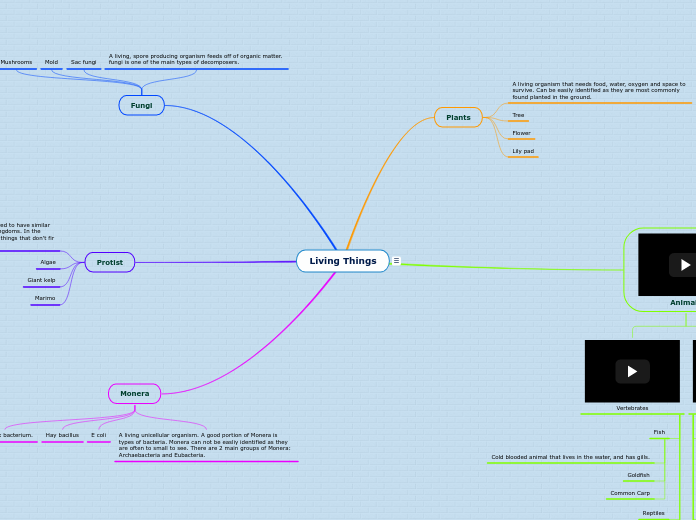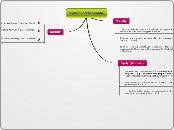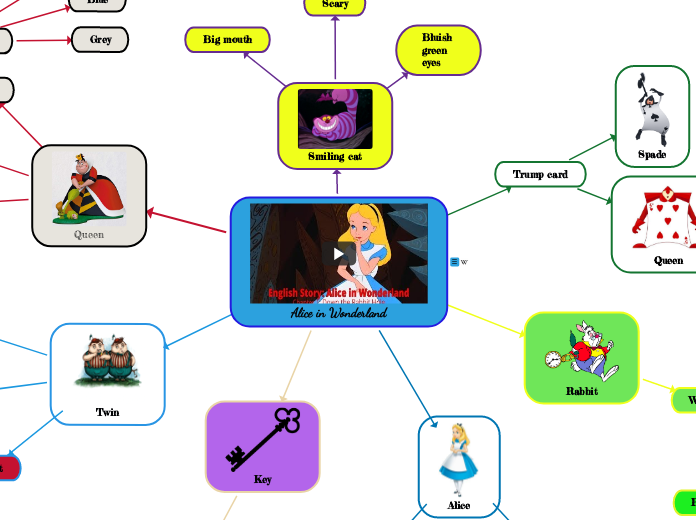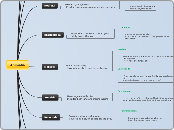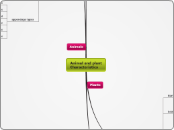Living Things
Videos for checklist:
- Animals
- vertebrates
- Invertebrates
- Monera
- Protist
- Fungi
- Plants
- Living things
Monera
A living unicellular organism. A good portion of Monera is types of bacteria. Monera can not be easliy identified as they are often to small to see. There are 2 main groups of Monera: Archaebacteria and Eubacteria.
E coli
Hay bacillus
Antharax bacterium.
Protist
Marimo
Giant kelp
Algae
A living, single celled organism that is belived to have similar ancestors to the fungi, animal and plant kingdoms. In the protist group their is a wide range of living things that don't fir into any other kingdom.
Fungi
A living, spore producing organism feeds off of organic matter. fungi is one of the main types of decomposers.
Sac fungi
Mold
Mushrooms
Animals
Invertebrates
Arthropod
Daddy Long Legs
Centipede
Multicellular creature that lives in many kinds of habitats depending on their specific classification. Arthropod consist of mostly insects and bugs.
Mollusca
Gastropods
Octopus
Multicellular organisms that occur in almost every habitat on the earth. The animals apart of the Molusca group very often have some sort of shell similar to a snail or slug.
Echinodermata
Sea cucumber
Star fish
Multicellular marine animals that obviously live in water. Fun fact: Echinoderms have no blood.
Annelida
Earth worm
Leech
Multicellular organism that live in bodys of water or in damp soil. Annelida consists mostly of worms.
Platyhelminthes
Monogenea
Tapeworms
Multicellular animal that lives in fresh or salt water. The platyhelminthes are free-living flatworms that eat worms, molluscs, small crustacean ETC.
Cnidarians
Medusozoa
Box jellyfish
Multicellular aquatic animals. Can be easily identified by their very common tenticals coming from the bottom of their bodies.
Porifera
Veronbimprpha
Demosponge
Aquatic animal that is made out of sponges.
Vertebrates
Amphibians
Poison dart frog
Salamander
Small cold blooded animals that need to live in wet or moist habitat. Can be easily reconized as they usually have wet/ slimy looking skin.
Birds
Penguins
Parrot
Warm blooded animal that are easily reconized by their feathers, beak, wings and can often be found flying.
Mammals
Humans
Tigers
Warm blooded animal that are easily reconized by their hair or fur.
Reptiles
Turtle
Gecko
Mostly lives on land and are easily reconized by their dry scales skin.
Fish
Common Carp
Goldfish
Cold blooded animal that lives in the water, and has gills.
Plants
Lily pad
Flower
Tree
A living organism that needs food, water, oxygen and space to survive. Can be easily identified as they are most commonly found planted in the ground.
